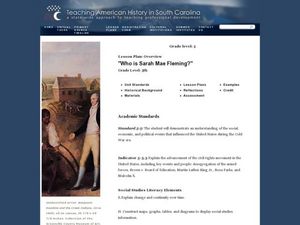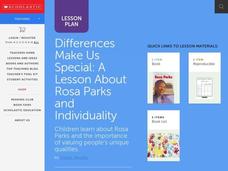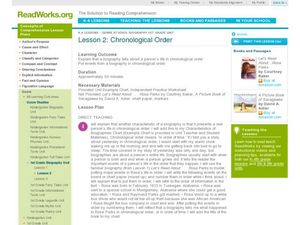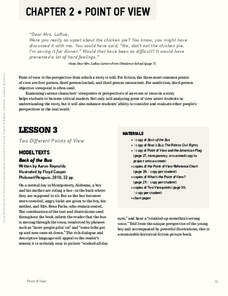Curated OER
Civil Rights Leader: Rosa Parks
All humans should have civil rights, but that wasn't the case in Alabama. This biographical presentation shares information about the life and inspiration that Rosa Parks brought to the Civil Rights movement. It explains her thoughts,...
Curated OER
Rosa Parks Day
Young scholars conduct research to discover about Mrs. Rosa Parks' historic role in the U.S. civil rights movement. They create an original artwork to depict the setting in which Mrs. Parks acted for fairness and then create a puppet...
Curated OER
Rosa Parks
Students examine the actions of Rosa Parks. They identify the reasons why philanthropy is good for the community and individuals. They write a letter to someone they admire because of their qualities.
Curated OER
Who Is Sarah Mae Fleming?
Fifth graders learn about two influential women. In this historical figures instructional activity, 5th graders work in groups to read articles about Rosa Parks and Sarah Fleming and share their findings with the class. Students use a...
Curated OER
Riding with Rosa
Learners examine a photo to experience history. For this teaching tolerance lesson, students view a photograph of Mrs. Parks sitting on the bus and place their own picture by hers. Learners imagine that they were sitting on the bus...
Curated OER
History Repeats Itself
Students read about an event that occurred 140 years ago to ascertain
information (who? what? when? where? why?) and to compare this event to Rosa Parks arrest almost 50 years ago. They retell the story from your point of view.
Curated OER
Dear Mrs. Parks Teacher's Guide
Young scholars read and respond to the book, Dear Mrs. Parks. In this African-American literature lesson, students read the text and examine several vocabulary words from the text. Young scholars answer 11 discussion questions and...
Alabama Department of Archives and History
Montgomery Bus Boycott: We Would Rather Walk!
Have historians use primary sources to learn about the circumstances and implementation of the Montgomery Bus Boycott, and think about the issue of boycotts as a means of effecting social change. Wrap it up with a letter to the editor...
Curated OER
Differences Make Us Special
Students explore the similarities and differences among their classmates. They are introduced to the Civil Rights Movement-that all people be treated equally and fairly. Students discuss the importance of appreciating individual...
Curated OER
Lesson 2: Chronological Order
Examining life events is a great way to learn about chronological order. Sequencing and time order are analyzed after reading a book about Rosa Parks. With a chart, the class works together to put the events from Mrs. Parks' life in the...
Scholastic
Point of View
The point of view in a story can dramatically change the story itself. Focus on finding the points of view in various reading passages with a language arts packet, which includes fiction and nonfiction text.
Curated OER
Montgomery Bus Boycott
Students investigate the Montgomery Bus Boycott. In this American Civil Rights Movement lesson, students determine whether or not they would have taken part in the boycott and write a 5 paragraph essay about the implications of partaking.
Curated OER
Risks and Consequences
Fourth graders explore situations and weigh the risks and consequences in each decision. After reading given narratives, 4th graders analyze the test to determine the cause and effect of various events. They determine if the risk was...
Curated OER
Fact and Opinion
In this fact/opinion worksheet, students write either fact or opinion after a set of 10 statements, then record their score out of 10.















